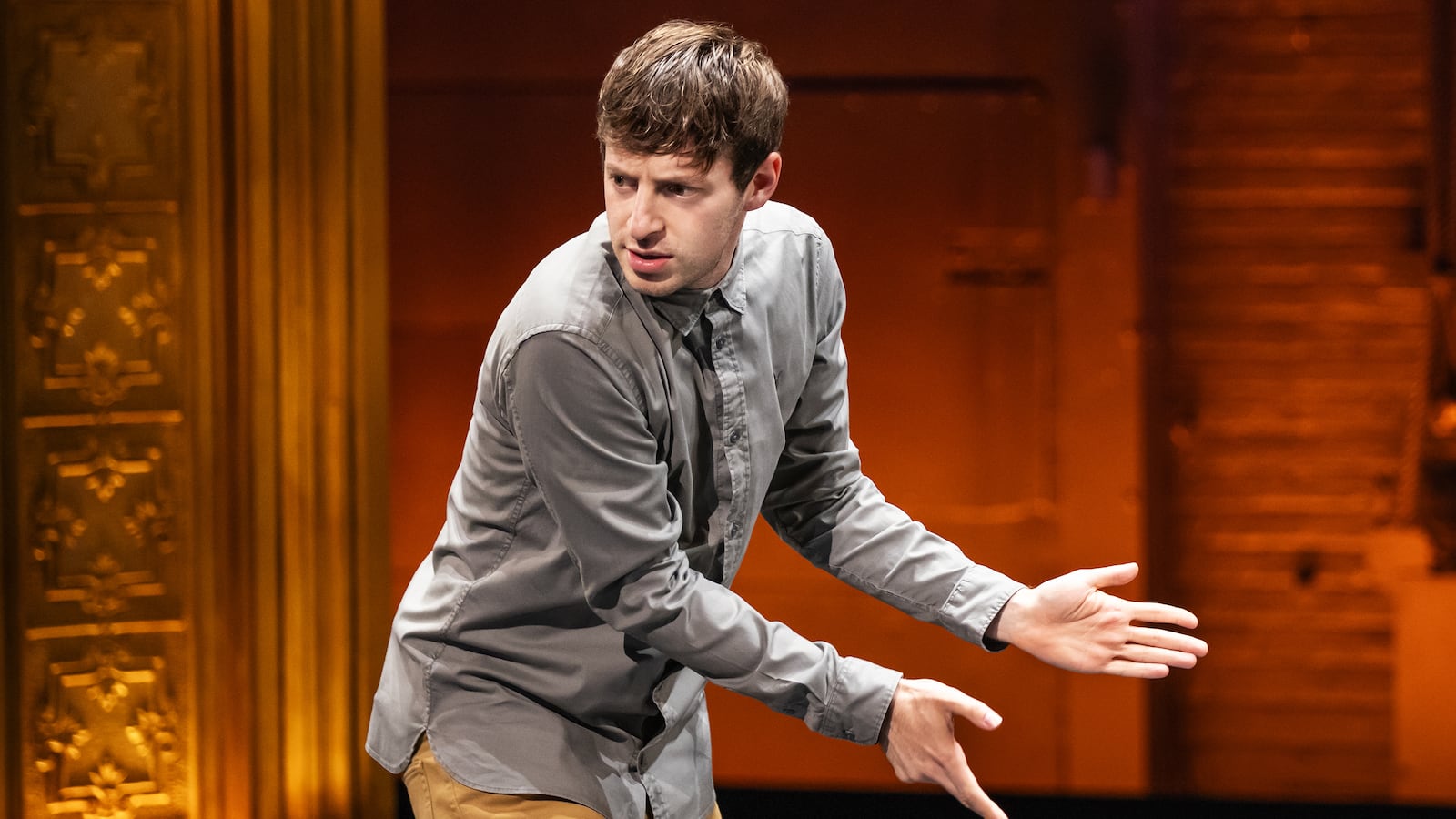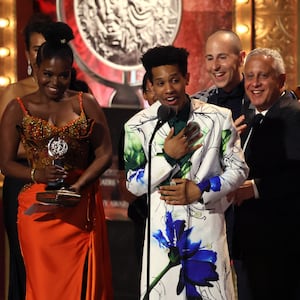It says much about the genius—and Alex Edelman’s rollicking, must-see Broadway debut show Just for Us (Hudson Theatre, to Aug 19) is a work of true genius—that at the end of this superlative 75-minute solo comedy show, after his identity as a Jew has been revealed to the group of New York City Nazis whose evening meeting he has infiltrated, that their boiling-over anger at his subterfuge and his eventual ejection from the room leaves him feeling downcast.
You’d think Edelman would just want to flee and run out to gulp the night air. But no. Until then he had entertained a fantasy of covertly changing hearts and minds, of reaching across some kind of aisle, of charming people as he always does in his comedy day-job—but here, right in front of him on a winter’s night in 2017, was the hate of those who want nothing of the sort, who passionately hate Jews and many other groups, and who want him out of there right now. So, for his own safety, do we.
Just for Us could simply show, mock, and condemn these Nazis’ despicable prejudice. It does do this—the incredibly funny Edelman makes clear that his Jewish identity is everything to him. But it also interrogates his own identity, and the conflicting senses of belonging and dis-belonging he has felt about it throughout his life. The show analyzes him, as much as it does the foundations of faith and belief, the intractability of hate, and the relentless engine of white supremacy.
Edelman did not, he insists to us, mean to write a political show—although, given its deserved stellar success off-Broadway and surely the same on-Broadway, it has made his name. He is lean, handsome, with floppy hair. He liked making silly jokes before, he says, regaling us with a serpentine tale involving a gorilla and Robin Williams, and then a zinger about non-fatness of horses. The British comedian Bridget Christie told him he should be illuminating “the terrifying present,” and so—despite worrying a comedian dabbling in politics was “the equivalent of standing up at a party and being like ‘I have a poem’”—created this show.
Edelman makes clear in the program how much it owes to its director, Adam Brace, who died unexpectedly at 43 around six weeks before the Broadway run started. “He was my closest collaborator for more than a decade, and, most importantly, a friend who understood me better than just about anyone and still somehow liked me,” Edelman writes. Just for Us is one hell of a vibrant, vivid memorial.
First, Edelman tells us about being submerged under “an avalanche of antisemitism” online, and paying those perpetrators back by sending them notifications that they’re making financial contributions to a Jewish fund. Then one Tuesday night, doing his favorite thing—"When I’m alone and a bit sad I lie on my couch, totally horizontal and I hold my phone like an inch from my face, like an otter”—he sees an advert for a group meeting in Queens for those living in NYC “curious about your #whiteness.”
Edelman thought to himself, “I live in New York City and as an Ashkenazi Jew I’m curious about my #whiteness. And I’m free tomorrow night at 9:15.”
At the apartment address, David Yosef Shimon ben Elazar Reuven Alexander Halevi Edelman—Alex’s birth name—finds there is a woman doggedly working, indeed entering her eighth month, on a 12,000-piece jigsaw. “Maybe white supremacist jigsaw puzzles are harder ‘cause like all the faces look the same,” Edelman ponders. There are 17 people in the apartment—12 men and five women—chatting around delicious “whites-only muffins.”

Alex Edelman in 'Just for Us.'
Matthew MurphyThe Jewish comic starts to flirt with an attractive white supremacist named Chelsea: “I thought to myself, with no irony, ‘You never know.’” His ingenious all-purpose response, “Can you believe it?” proves useful when Chelsea begins ranting about the Trump White House, and Jared Kushner’s Jewishness. Edelman has to stop himself from saying, “Oh, I hate Jared Kushner. He sits behind me at synagogue on the Upper East Side. He's so goddamn loud.” “That’s true by the way, he says to us, the audience. “Not a fan. He’s arrogant. Like when they call him to the Torah he walks up like he wrote it.”
As the evening continues, Edelman weaves in stories of his own life. “I am white, but, like, I grew up in a place where there was a strict hierarchy of whiteness. I grew up in Boston. I grew up in this really racist part of Boston called Boston,” he says, going through that city’s strict social caste system. He recalls, very funnily, when his parents held a Christmas one year for a bereft Gentile friend of theirs, and how enamored he and his brother AJ were by, well, just everything. That story is capped by a cheering put-down—that must be seen live at the theater—delivered to a judgmental rabbi by Edelman’s dad.
Back at the party, the group are furious about Prince Harry marrying Meghan Markle, because she is mixed race: “I forgot that. You know who didn't forget? White nationalists. They're very upset about the whole thing. They prefer he marry like a second cousin, as per usual.” How strange it must have been for Harry to have done cocaine, Edelman says, if it involved snorting it off banknotes featuring the image of his grandmother.
Just as he wants to convert the racists around him to acceptance, so Edelman also imagines a Hollywood rom-com, based around his hidden Jewishness and Chelsea’s toxic racism, that true love conquers. But in the cold light of the room, talk of Markle’s background segues to collective whining about statues of their white heroes being removed from plinths and white history being erased. They are the true victims of racism, the group says. Diversity initiatives are “a plan to slowly genocide white people, who are being replaced in their own country.”
“At some point,” Edelman recalls, “someone is like ‘Jews are sneaky and they’re everywhere.’ And I’m just like, ‘Kind of hard to argue with that one right now.’” He feels sorry for the group, being in the most diverse borough in the most diverse city in the world. They’re losers, without any identity—plus, “You can’t even get 17 Nazis together without a Jew being sat right there in the middle of them.”
“I see myself very much as a Jew,” Edelman says to us. “More than anything else. And I hate that. Like my first thought every morning waking up is like ‘Jew waking up.’ And not just Jewish. Religious. Thoughtful. It’s invested in every part of myself. Like, if I was raised secular in a cool place like New York or Los Angeles, I think I'd consider myself bisexual. But because I was raised religious in a repressed place like Boston, I consider myself straight with some secrets.”

Alex Edelman in 'Just for Us.'
Matthew MurphyEdelman recalls realizing he was Jewish for the first time, around 8, his grandfather stopping him from eating a pizza with sausage on it. What did being Jewish mean, he asked his grandfather. “It means you’ll never be happy,” his grandpa told him. Edelman said to his father, “Papa, I don’t want to be Jewish.” His grandfather, smiling, said, “Sweetie, that’s the most Jewish thing there is.”
The show’s philosophical heart becomes focused around the question of empathy, and who we do and do not owe it to. In the meeting, Edelman talks and talks about technology; he delights in winning the group over with his knowledge. His fantasies of being with Chelsea and changing them to non-Nazis thrum again. Then his Jewish identity is revealed. As all hell breaks loose, he thinks, “They don’t accept me? But I’m such a delight.”
Amid the hullabaloo, someone says the notion of white privilege is bullshit. Edelman replies, “I got a free muffin for it like an hour ago.” (A woman who Edelman dated afterwards said the epitome of white privilege was “a Jew walking into a meeting of white nationalists and being like, ‘This’ll probably be fine.’”)
Despite being so clearly brilliant with words, Edelman does not deliver a grand set of put-downs to this ghastly group of people. Instead, the charmer feels rejected both as the comic who can usually win anyone over, and also “for a moment there I was in. I was white. Childhood dream achieved. And then they found out I was Jewish, and I wasn’t a person anymore. I was a Jew and the walls went up.” He leaves, not with righteous invective flowing forth from his lips, but in a flurry of embarrassment and apologies.
Later, Edelman realizes how futile his fantasy was. There can be no reconciling, talking, understanding with these violent racists. As Edelman says, “They want us gone. They have no good faith. And when I say us, I mean us. Like, the fact that you guys bought a ticket to see a Jew is enough to indict you. See you on the train.”
In contrast to that evening in 2017, Just for Us is not an exercise in communicative futility—far from it. Yes, this is brilliant comedy—of social excruciation, of Edelman honestly and tenderly deconstructing his own identity, of a tense build-up to an identity being revealed in a hostile environment. His delivery and narrative control—even his ad-libbing—are peerless. The show is also an examination of identities more generally, of history, prejudice, and the many purposes and uses of humor.
Our theater was full of both raucous laughter, and also a sadness and anger at what bigots bring so shamelessly to our world. Without saying a word, Edelman takes one small act of revenge before leaving the apartment to chip away at that edifice of hate. Naturally, in the retelling, it’s hilarious.







